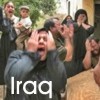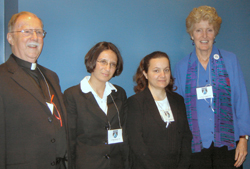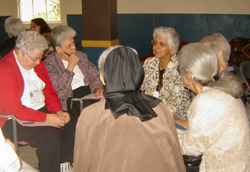 |
Western
Justice Promoters
Berkeley, California, October 27, 2008 -- The Western Dominican Justice Promoters are taking decisive action in their region to promote awareness and understanding, as well as collaborative action, with respect to key issues from the North American Dominican Call to Justice. The Promoters study and preach on human rights issues, specifically related to war, immigration and human trafficking. These three issues were selected for focus because they affect the lives of most people in the western region, either directly or indirectly. On October 4 the Western Dominican Justice Promoters held their first public event. Father David Farrugia, OP and the parishioners of St. Mary Magdalen Parish in Berkeley generously extended their hospitality. Exploring the Iraqi refugee crisis, the day was provocatively titled Where Can 4 Million Displaced Persons Find Homes? The hard realities of the status of millions of Iraqis, resulting from five years of U.S. military action, were presented by three Dominican sisters. Sister Arlene Flaherty, a member of the Blauvelt, New York Dominicans, has been a justice promoter and an educator for more than 25 years. She is currently working with Catholic Relief Services (CRS). Her first trip to Iraq was in 1999 when she participated in a delegation to document the impact of the sanctions and embargo on the country’s children. Those findings were reported to the United Nations Human Rights Commission in Geneva. Earlier this year she traveled with a CRS delegation to Syria and Lebanon to investigate the plight of Iraqi refugees. Sister Arlene is actively working to influence U.S. lawmakers and others to formulate a realistic and humane policy towards the displaced victims of the war, “the largest humanitarian crisis in the world today.” Sister Diana, a member of the Dominican Sisters of St. Catherine of Siena in Mosul, Iraq, has been studying and living in Michigan since 2006. Sister Rihab, also a Dominican sister from Mosul, has been studying in the U.S. since 2002. They both described in graphic and often disturbing terms what life is like now for the people of Iraq. Electricity, when available, runs only a few hours a day. The country’s infrastructure, including water supply and roads, is severely damaged by bombing. Violence is episodic and random; both Sister Diana and Sister Rihab have family and friends who have experienced it. In a culture in which education is highly valued and a university system has existed since the 13th century, today teachers and students at all levels are hampered by lack of supplies, safe transportation, and fear of kidnappings. Medical equipment and supplies are extremely difficult to find. People have been forcibly removed from their homes, jailed and/or tortured. These are some of the reasons why so many Iraqis are now refugees; as many as two million are displaced within Iraq. At least that many have fled to Jordan, Lebanon, Egypt, Syria and Turkey, but without legal status they are unable to rebuild their lives. The resources of the host countries are now strained. Many of the refugees are Christians, a religious minority that had peacefully co-existed with Muslims for a long time. The study day was designed to provide the group of 75 attendees with an overview of the situation for Iraqi refugees and the human rights and justice issues involved. There were opportunities for questions, personal reflection, and small group discussions. In the afternoon Father John Morris, OP, professor of Theology at St. Mary’s College in Moraga and Promoter of Peace and Justice for the Western Dominican Province, joined the panel for a discussion of the ways in which one’s faith and spirituality informs our response to the plight of the Iraqi refugees. Father John provided the group with four key principles as a Gospel context and guide to action. 1.God created me as a human with the right to dignity. 2. Every other human, also created by God with the same right, is my neighbor. 3. In living with my neighbors, I ultimately will be judged by how I treat the weakest and most vulnerable. 4. The purpose of a society of neighbors must be the common good. Before the day concluded with a sung blessing, attendees were encouraged to do whatever they could to keep the Iraqi refugees and their desperate needs in full view of the human family. Everyone addressed postcards to their congressional representatives, advocating for 30,000 visas for Iraqis in the coming year. Sisters Diana and Rihab both hope to return to their country and minister to their people. They see great possibilities emerging from relationships between Iraqi and American people. “After all,” they said, “we have a very long history, which you don’t. And you have a clear future, which we don’t. Perhaps we can share.” Western Dominican Justice Promoters: Dominican Laity, Western Region, Dominican Sisters of Mission San Jose, Dominican Sisters of San Rafael, Western Dominican Province, Dominican Sisters of Tacoma, Dominican Sisters of Oakford, Adrian Dominican Sisters.
Kate Martin |
Related Links: CNN International: Nearly half of the Christian population of Mosul, in northern Iraq, have fled their homes following a rise in attacks against them, according to the UN. MORE
Where Can 4 Million Displaced Persons Find Homes? |



